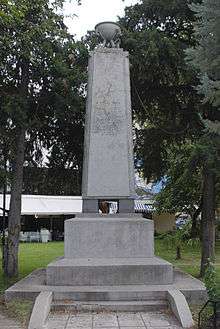Drama uprising
| ||||||||||||||||||||||||||||||
The Drama uprising (Greek: Εξέγερση της Δράμας, Bulgarian: Драмско въстание, Dramsko vastanie) was an uprising of the population of the northern Greek city of Drama and the surrounding villages on 28–29 September 1941 against the oppressive Bulgarian occupation regime. The revolt lacked organization or military resources and was swiftly suppressed by the Bulgarian Army with massive reprisals. The revolt had guidance from the Communist Party of Greece (KKE).
Background
The Bulgarian Army entered Greece on 20 April 1941, at the heels of the Wehrmacht's invasion of Greece, and eventually occupied the whole of northeastern Greece east of the Strymon River (eastern Macedonia and Western Thrace), except for the Evros prefecture, at the border with Turkey, which was occupied by the Germans. Unlike Germany and Italy in their respective occupation zones, Bulgaria officially annexed the occupied territories, which had long been a target of Bulgarian irredentism, on 14 May 1941.[1] A massive campaign of Bulgarisation was launched, which saw all Greek officials (mayors, school-teachers, judges, lawyers, priests, gendarmes) deported. A ban was placed on the use of the Greek language, and the names of towns and places changed to the forms traditional in Bulgarian. In addition, the Bulgarian government tried to alter the ethnic composition of the region, by expropriating land and houses from Greeks in favour of Bulgarian settlers, and by the introduction of forced labour and of economic restrictions for the Greeks in an effort to force them to migrate.[1]
Uprising and aftermath
In this situation, a revolt broke out on 28 September 1941. With the guidance of the Macedonian politburo of the Communist Party of Greece,[2] it started in the city of Drama and quickly spread throughout the surrounding area. In Drama, Doxato, Choristi and many other towns and villages clashes broke out with the occupying forces. On 29 September, Bulgarian troops moved into Drama and the other rebellious cities to suppress the uprising and seized all men between 18 and 45. They were reported to have executed over 3,000 people in Drama alone. An estimated 15,000 Greeks were killed by Bulgaria's occupation army during the next few weeks and in the countryside entire villages were machine-gunned and looted.[3] Most of the members of the Macedonian politburo of the Communist Party of Greece were slaughtered by the Bulgarians, except for one member.
The massacres precipitated an exodus of Greeks from the Bulgarian into the German occupation zone in Central Macedonia. Bulgarian reprisals continued after the suppression of the uprising, adding to the torrent of refugees. Villages were destroyed for sheltering “partisans” who were in fact only the survivors of villages previously destroyed. The terror and famine became so severe that the Athens government considered plans for evacuating the entire population to German-occupied Greece.[4] By late 1941, more than 100,000 Greeks had been expelled from the Bulgarian occupation zone.[5]
References
Sources
- Mazower, Mark (1995). Inside Hitler's Greece: The Experience of Occupation, 1941–44. Yale University Press. ISBN 0-300-08923-6.
- Mazower, Mark (2000). After the War was Over: Reconstructing the Family, Nation, and State in Greece, 1943-1960. Princeton University Press. ISBN 978-0-691-05842-9.
- Miller, Marshall Lee (1975). Bulgaria during the Second World War. Stanford University Press. ISBN 978-0-8047-0870-8.
